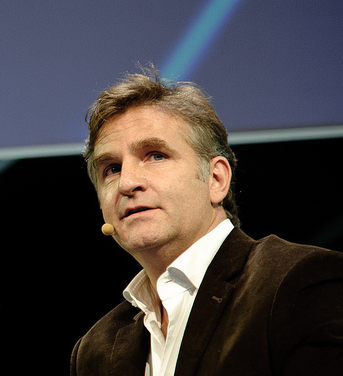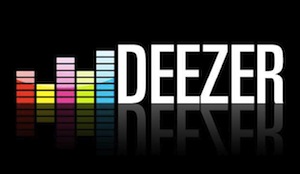Deezer, the web-based music streaming company that has just picked up $130 million in funding from Warner Music owner Access Industries and Idinvest, is gearing up for another announcement on Wednesday. There, it will lay out more details about what it plans to do with the cash injection — the largest ever for a French startup — and, we have heard, unveil a new user interface and other features.
In the meantime, Deezer’s CEO Axel Dauchez has talked to TechCrunch about his very bullish plans for the company, and strong belief that digital music doesn’t have to be a money-losing business.
He’s coming from the position of someone who should know: Deezer has been profitable since the end of 2010, he tells TechCrunch. It now has 2 million paying subscribers, 7 million active monthly users, 26 million registered users, and 20 milion music tracks — up to now all based on about $15 million in funding.
He says that so far, Deezer has grown on principles of “patience and strategy.”
Indeed, although the company was founded in 2006 in France, it was only last year that it began to roll out internationally in earnest.
“We are in the mindset that it doesn’t pay to be quick,” he says of building out a music streaming business. “You do what you have to do every day. It sounds dull but it’s a choice between building a company that is sustainable or one that is built on speed and market share that may not be sustainable.”
Still Deezer is clearly still a work in progress. The big question is whether Deezer can keep its pace, and its profitability, as it takes the big cash injection and all the ambition that comes riding along with it: the company says that its plan is to take 5% of the world’s music market by 2016.
One notable place where Deezer has yet to go, and which might pose a big bite to its cost base, is the U.S. A plan for the U.S. market is one thing that might well get announced tomorrow; it’s a market that Dauchez definitely likes to talk about.
He believes, for example, that the U.S. is still in “virgin territory” when it comes to music streaming services, and that Spotify is far from winning the whole of the market. “The dominant player in terms of time and money spent on digital music is iTunes,” he says. “Nothing has been done yet for music streaming. It has yet to be cracked.”
Deezer has up to now been built primarily on a freemium model: as with Spotify and the others, the belief is that the free service can be used as a springboard for some to become paying subscribers.
But the U.S., Dauchez hints, may see Deezer taking a different approach. “I’m not 100 percent sure we have to use a free service as a recruitment channel in the U.S.,” he says, noting that this can be a very unprofitable route to building revenues especially as a company scales up because of music royalty payments. This, he says, is not an “efficient” way to grow. “In some countries there is a difference between doing the most efficient thing and matching the competition.”
As a point of comparison, Spotify at the end of July reported 15 million active users with 4 million paying subscribers. A report from PrivCo last week disclosed figures that showed that while Spotify’s revenues continue to grow — revenues in FY 2011 were up 151% to $244 million — they are also seeing big losses — growing by 60% to -$59 million. PrivCo pinpoints royalty payments as one of the main reasons for the problems. “Every new dollar of revenue went directly to music companies as royalty payments, evidencing the fact that the more members Spotify adds, the more money the company loses,” CEO Sam Hamadeh writes. Spotify has not confirmed those figures.
With very little in the way of VC financing up to now, Deezer has been using other routes to building up its user base, and Dauchez says that this is what has given it its “strategic edge”.
In addition to a partnership with Facebook (much like the partnership that Spotify has leveraged so well), Deezer has been partnering with carriers to cross-sell its service. This plays on carriers’ ambition to sell more to users than simply voice and data, and gives Deezer a steady revenue stream through a licensing deal with the carrier that potentially can be leveraged into paid subscriptions.
“We know more than anybody how to maximise the value of music in that ecosystem,” Dauchez says. Deezer’s carrier partnerships have spanned 20 countries so far, including France Telecom’s Orange, which liked the idea so much that it took a stake in Deezer in the process of partnering back in 2010, although Orange has not reinvested this time around. Spotify has had a few operator partnerships as well — notably it recently signed up Deutsche Telekom in Germany to resell Spotify subscriptions.
Deezer’s carrier partnerships to date include Orange (France, United Kingdom Poland, Ivory Coast, Mauritius, Romania), Everything Everywhere (United Kingdom), T-Mobile (United Kingdom, the Netherlands, Austria), Belgacom (Belgium, Luxembourg), Telenor (Hungary, Montenegro, Thailand) and Millicom (Honduras).
Another area that Dauchez says has helped Deezer compete against other music streaming companies is that it has a good recommendation engine, which is specific to different countries.
“We believe that when someone pays 10 euros per month they deserve your vision about music,” he says. “I believe that people don’t know what they want to listen to; they need some curation.” The recommendation engine is getting another boost today, with Deezer joining Echo Nest’s Rosetta Stone platform. This is a data resolution service that gives a common platform to music applications and lets them interact more easily with each other. Others on Rosetta Stone include Spotify, Rdio, Twitter, Seatwave, and musiXmatch and others. Echo Nest also powers radio and discovery for Spotify.
[photo: LeWeb, Flickr]
